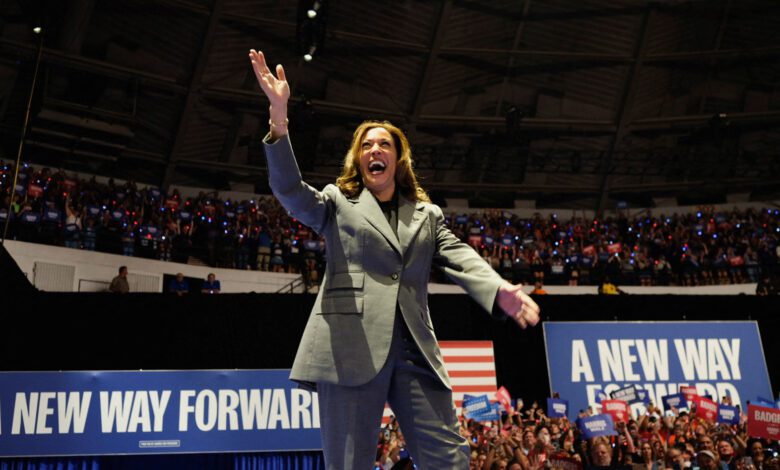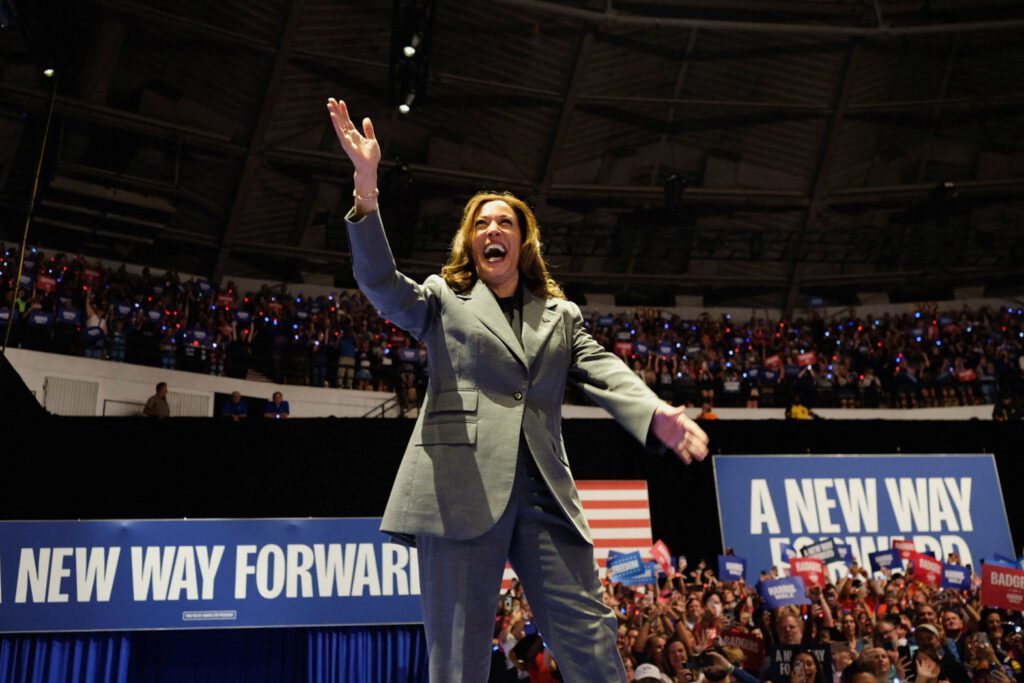Kamala Harris Gains Momentum as Key Muslim Groups Rally Behind Her in US Election

In a significant boost to her presidential campaign, Kamala Harris has secured endorsements from prominent Muslim groups in the United States. With the support of influential organizations like Engage Action, Harris is gaining an edge over her Republican rival, Donald Trump. This backing from the Muslim community, which holds millions of votes, is expected to have a profound impact on the 2024 election, further widening the gap between the two candidates.
Harris Secures Key Endorsements in the Muslim Community
Kamala Harris has been making strides in her presidential campaign, notably among minority groups in the US. Recently, the superstar Taylor Swift endorsed Harris, signaling a wave of support from various sectors. But perhaps more significantly, Harris has now won over a critical demographic—Muslim Americans.

The Muslim group Engage Action, which represents a substantial voter base, has officially endorsed Kamala Harris for president. This group, alongside smaller but influential Muslim organizations, has been rallying behind her, citing her policies that favor immigrant communities and her stance on racial justice.
Why Engage Action’s Support Matters
Engage Action is not just another group; it is one of the largest Muslim organizations in the US, claiming to influence over 2.5 million voters. This endorsement holds considerable weight in an election where every vote counts. The Muslim vote, although only 1% of the total population, is highly dispersed across key battleground states, making it crucial in a close election.
The group’s endorsement is a reflection of Donald Trump’s rocky relationship with Muslim communities. His past statements, particularly during his tenure as president, alienated many within the Muslim population, from the travel bans targeting Muslim-majority countries to inflammatory rhetoric surrounding immigration and terrorism. For many Muslims in the US, these policies were seen as discriminatory and divisive.
The Impact of Trump’s Policies on Muslim Communities
Donald Trump’s hardline stance on immigration and national security has long been a point of contention. In particular, his administration’s 2017 travel ban targeting several Muslim-majority nations sparked widespread protests and legal challenges. The ban, which was justified as a security measure, was seen by many as a direct attack on Muslim immigrants and their families.
Moreover, Trump’s inflammatory remarks, such as describing Middle Eastern immigrants as potential terrorists, further distanced him from the Muslim electorate. His statements have often been criticized for stoking Islamophobia, and many Muslim Americans have felt marginalized under his leadership.
Kamala Harris’ Appeal to Muslim Voters
Kamala Harris has taken a markedly different approach. As a former Attorney General and current Vice President, Harris has consistently advocated for immigrant rights and religious tolerance. Her policies on immigration reform, protection for DACA recipients, and her inclusive rhetoric have resonated with Muslim Americans, particularly those who felt targeted during Trump’s presidency.
Her campaign has also received support from other Muslim organizations, including the Black Muslim Leadership Council and the American Muslim Democratic Caucus. These endorsements signal a broader trend of Muslim voters aligning with the Democratic Party, much like they did during Joe Biden’s 2020 campaign.
The 2020 Muslim Vote and What It Means for 2024
In the 2020 election, Muslim groups played a pivotal role in mobilizing votes for Joe Biden. Engage Action, in particular, claimed to have mobilized over one million votes, contributing to Biden’s victory. With their backing of Kamala Harris, the stakes are even higher for 2024. Muslim votes, dispersed across swing states like Virginia, Arizona, and Minnesota, could be the deciding factor in a close race.
The situation is reminiscent of other minority voting blocs, such as the Sikh vote in Canada, which has a similar dispersal and influence in key districts. When minority votes consolidate around a single candidate, they can create significant shifts in electoral outcomes, as seen in previous elections.
Trump’s Attempt to Rebuild His Image
Despite these challenges, Donald Trump has been working to repair his image among Muslim voters. In recent rallies, Trump has downplayed his earlier rhetoric and focused instead on economic issues that affect all Americans. He has also highlighted the conflicts in Gaza and Lebanon during Joe Biden’s term, emphasizing that his presidency was marked by relative peace in the Middle East.
Trump has argued that Muslim communities have suffered more under Biden’s leadership, particularly due to the ongoing Israeli-Palestinian conflict. According to Trump, while Biden and Harris have failed to mediate the situation, his administration maintained peace in the region.
The Role of Muslim Votes in Swing States
The Muslim electorate’s influence extends beyond individual endorsements. States like Virginia and Arizona, which have significant Muslim populations, are key battlegrounds in the upcoming election. Muslim voters in these states could tip the scales in favor of Harris if they continue to coalesce around her candidacy.
Kamala Harris’s Recent Remarks Ignite Debate: A Closer Look at Political Messaging
In addition to their presence in swing states, Muslim business owners, particularly in New York, also represent a sizable voting bloc that could influence the outcome in these regions. Muslim Americans are not just concentrated in one area but are a diverse and politically active group, which makes their support even more critical in a tight race.
The Path Ahead
As the 2024 election draws nearer, the support of groups like Engage Action could prove decisive. Kamala Harris has already won over smaller Muslim groups, and now, with the backing of Engage Action, her campaign is gaining momentum.
For Donald Trump, this presents a significant challenge. His efforts to rebuild relationships with minority voters may not be enough to offset the damage done during his presidency. However, as the election progresses, Trump is likely to continue focusing on economic and foreign policy issues in an attempt to win back some of the lost support.
Conclusion
The Muslim vote, though small in percentage, carries a significant impact in the US electoral landscape. As Kamala Harris continues to gain support from Muslim groups, her path to the presidency becomes clearer. However, with Trump still holding sway over his base, this election is far from decided. Both candidates will need to navigate a complex web of minority votes, celebrity endorsements, and policy debates in the lead-up to 2024.






One Comment